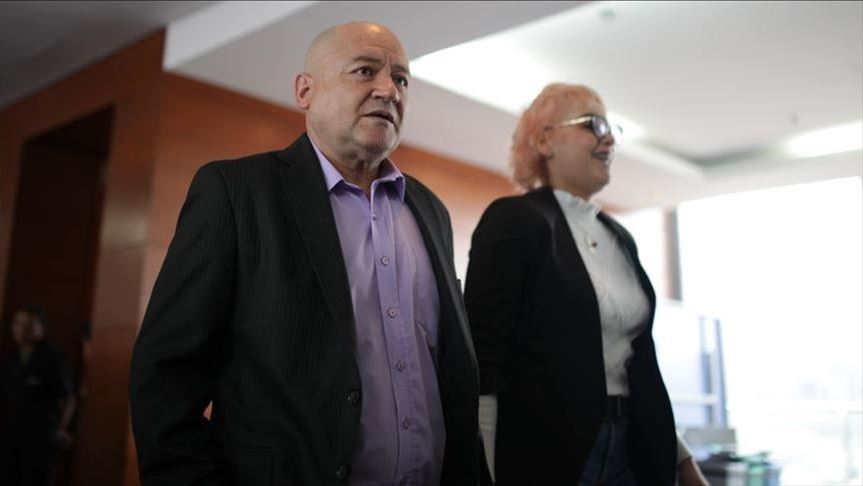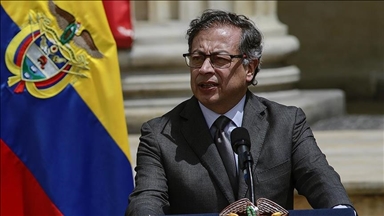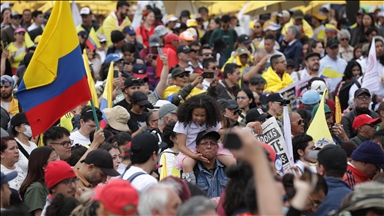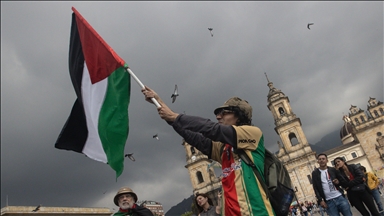
BOGOTA, Colombia
Colombia’s Common Revolutionary Alternative Force (FARC) party has called for a demonstration against the killings of former rebels in its ranks.
The former Marxist rebel group led a bloody more than 50-year campaign against the government, before signing a peace deal in 2016 and forming a political party.
Calros Antonio Lozada, a senator of the FARC party, said the group hopes to raise awareness among all Colombians about the seriousness of the situation -- which could potentially mar peace in the country.
He told Anadolu Agency that violence in the post-deal period claimed the lives of 186 “unarmed” people.
He added the FARC party will ask the Inter-American Commission for Human Rights (IACHR) to grant precautionary measures to the political group to protect lives and pressure the government to comply with the peace deal.
Similar protests were held in late November when hundreds of demonstrators protested against rampant corruption, pervasive human rights abuse and unpopular economic initiatives of President Ivan Duque.
Protestors also criticized Duque's slow approach to embrace the peace deal and claimed the government does not want to implement the peace process.
Anadolu Agency (AA): Last Monday, the Senate Peace Commission met to analyze the phenomenon of violence against ex-militants in Colombia. What conclusions did they reach?
Carlos Antonio Lozada (CL): The main conclusion we reached is the creation of a high-level commission with representatives of all the parties that have a seat in Congress and in which the interior minister, justice minister, attorney general, prosecutor general and ombudsman will analyze the situation.
We want to find a permanent solution to this situation which is causing the systematic murder of those who signed the peace deal.
Another objective is to launch an early warning system, mark our presence and determine risk factors against FARC members that the state has undermined.
AA: You and the FARC party have placed a lot of emphasis on the systematic murders. What evidence do you have to say crimes are systematic and linked to each other?
CL: The main evidence is the 186 former militants killed after the signing of the peace agreement.
Some argue that this has been presented in general, as a phenomenon of violence in the territories, but it makes no sense that a population of 13,000 Colombians, who do not represent a large demographic percentage, are the main victims of that violence that occurs in the territories.
From that point, there is a systematic factor. But also, the fact that these murders occur amid a stigmatization and singling out campaign by far-right political circles.
It is evident that these murders are being carried out every week, so we do not doubt that we are facing a repetition of what was the genocide of the Patriotic Union in the 1980s of the last century.
AA: Does the government of Colombia confirm the figure of 186 killed or are there contradictions?
CL: Whenever we talk about these issues, discussions arise as to whether they are 186, 180, 130 or 120, but the truth is that it is alarming that those who signed the peace, left the weapons and believed in the state, are being killed.
AA: The government has argued that some murders could be the result of retaliation for the damage that ex-militants would have caused during the war. What do you say about this?
CL: That claim of the government is perverse. Governments in the world have a primary obligation that is to guarantee the lives of all their citizens. That position of the government, besides being indolent, seems extremely dangerous because it leads to denying an obvious truth.
AA: The Duque government has announced different measures to protect ex-militants in recent months, such as creating a special unit in the Prosecutor's Office to investigate the murders. What do you think of the measures?
CL: The government has limited itself to doing plan analysis without these strategies actually giving results. The peace agreement contains a series of measures and emphasizes the need to build public policies and an institutional framework that sought to protect with guarantees, not only those who signed the agreement but also the social leaders and the territories where the conflict has always occurred. That is why we demand the government to not continue giving long to the implementation of everything that is contained in the peace deal.
AA: What specific measures do you refer to?
CL: The permanent activation of the National Commission of Security Guarantees, the fight against the phenomenon of paramilitarism, support the construction of local and regional pacts to eradicate the violence in the politics and strengthen the Prosecutor's Office. So that it can give results not only terms of identification who are behind the trigger of arms, but who is the intellectual author and the causes that are determined the persistence of the phenomenon of paramilitarism in Colombia.
AA: Have you thought about going to international bodies like the IACHR or the UN Security Council to get a solution?
CL: Of course. We are collecting all the necessary information to go to the Inter-American Commission on Human Rights, the UN Human Rights system and also the UN Security Council.
AA: What specific legal strategies have you thought to reach these instances?
CL: We are going to ask for precautionary measures. We are collecting all the information about each one of the members of the party who have been killed, but also documenting the threats and displacement of which our militancy is being victimized so that there is sufficient evidence and we hope that and these precautionary measures are granted for all the party members and international pressure begin to be exercised so that the government fully fulfills the agreed commitments.
*Daniela Mendoza and Juan Velez in Colombia, Beyza Binnur Donmez in Ankara contributed to the story
Anadolu Agency website contains only a portion of the news stories offered to subscribers in the AA News Broadcasting System (HAS), and in summarized form. Please contact us for subscription options.




